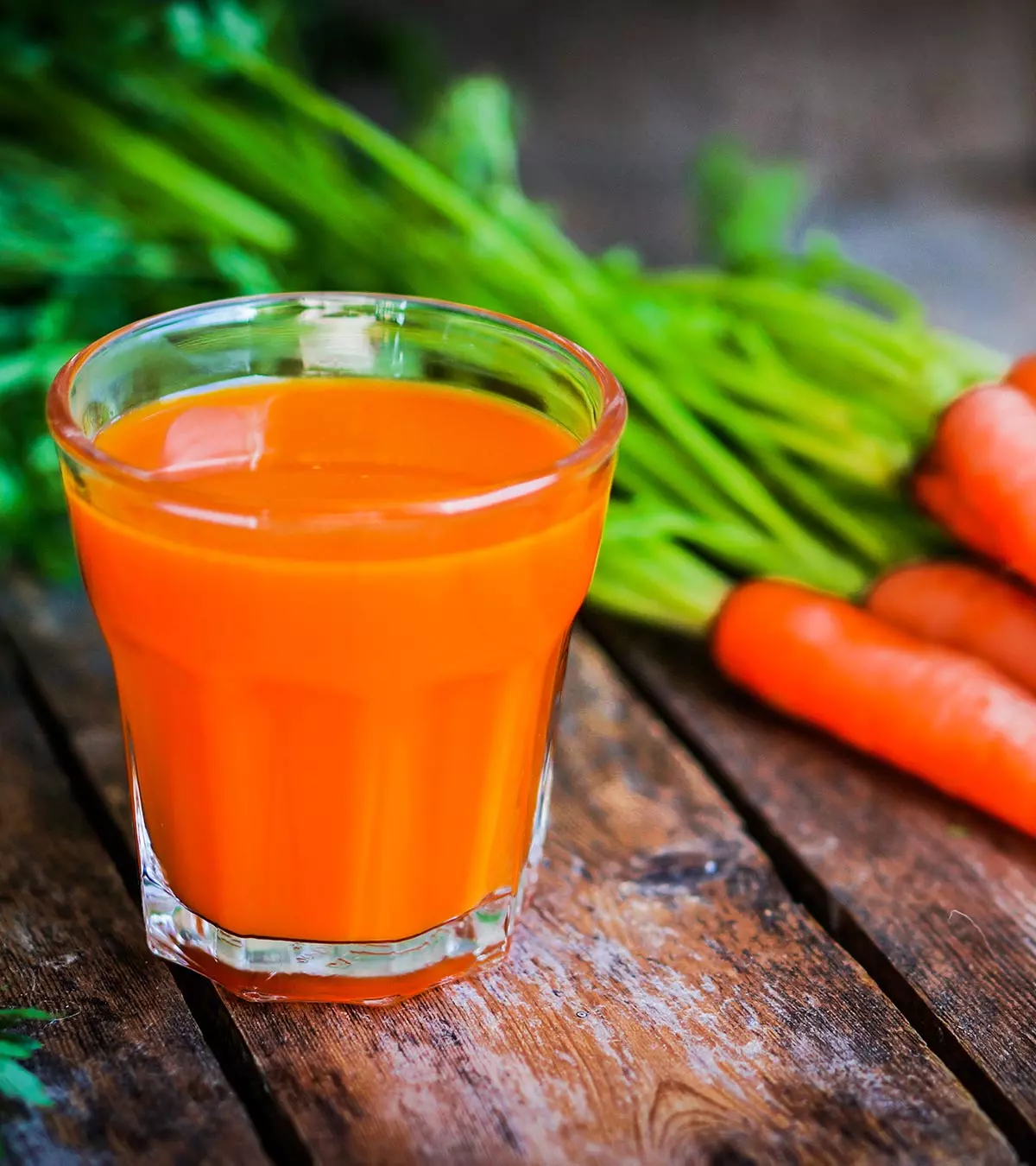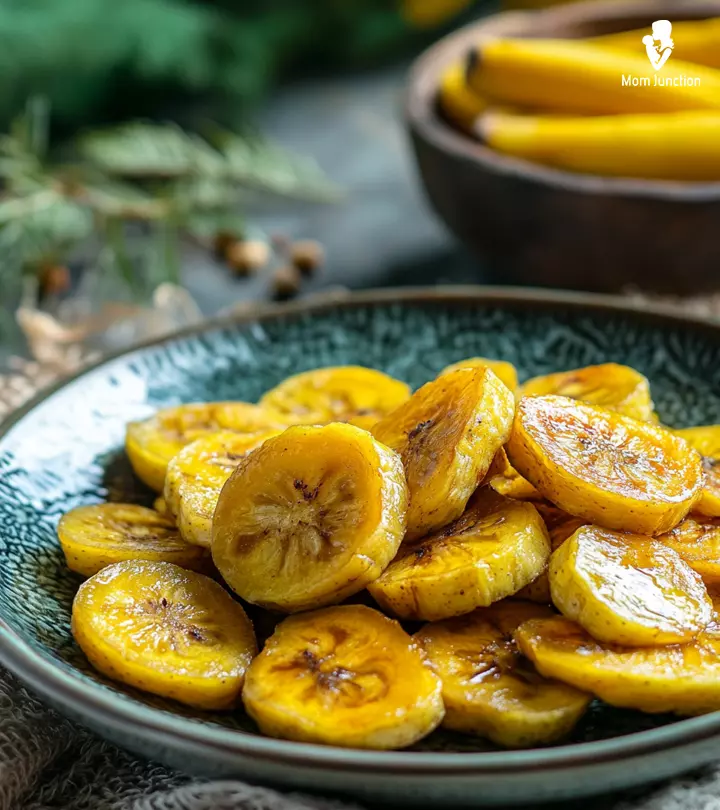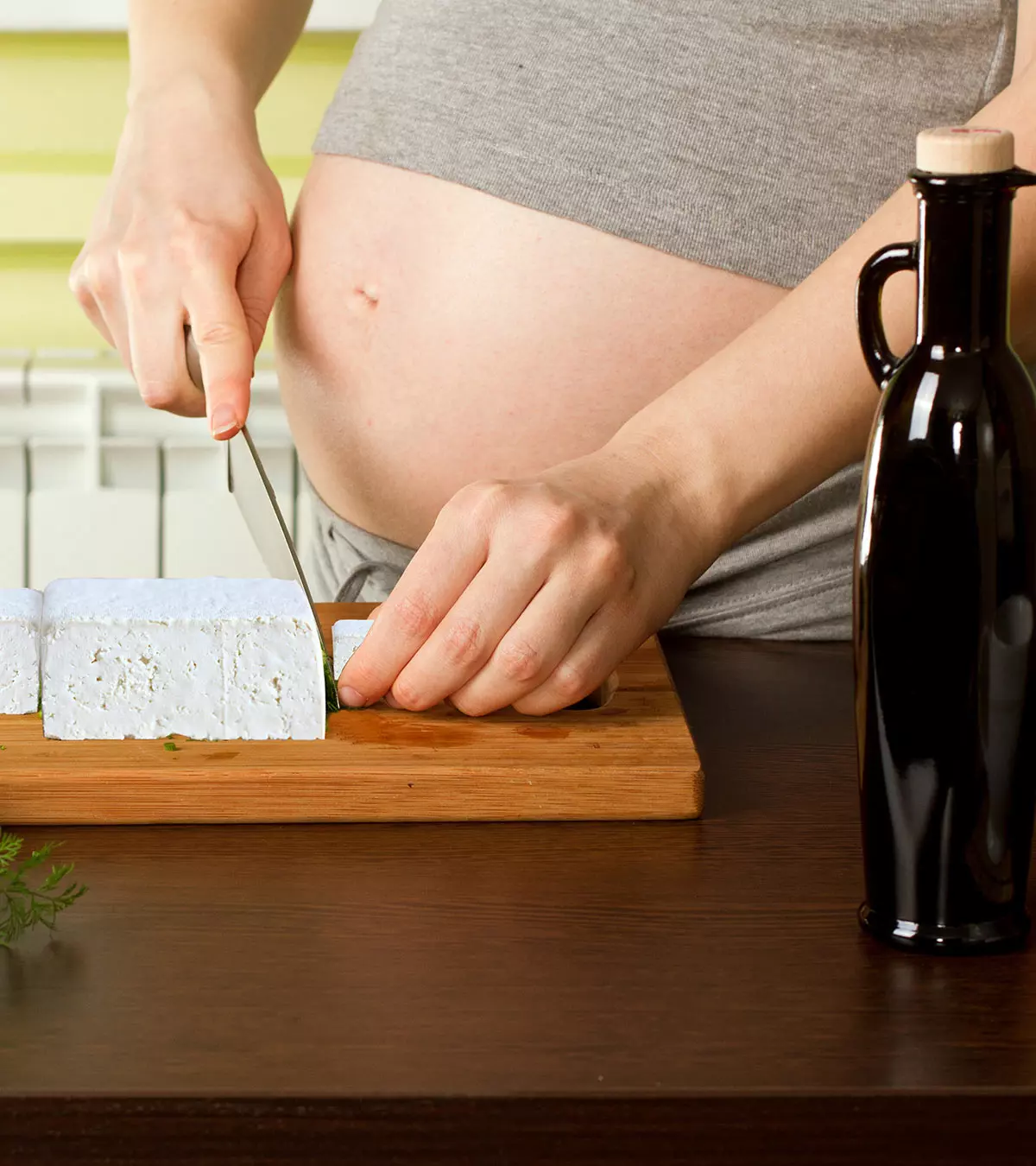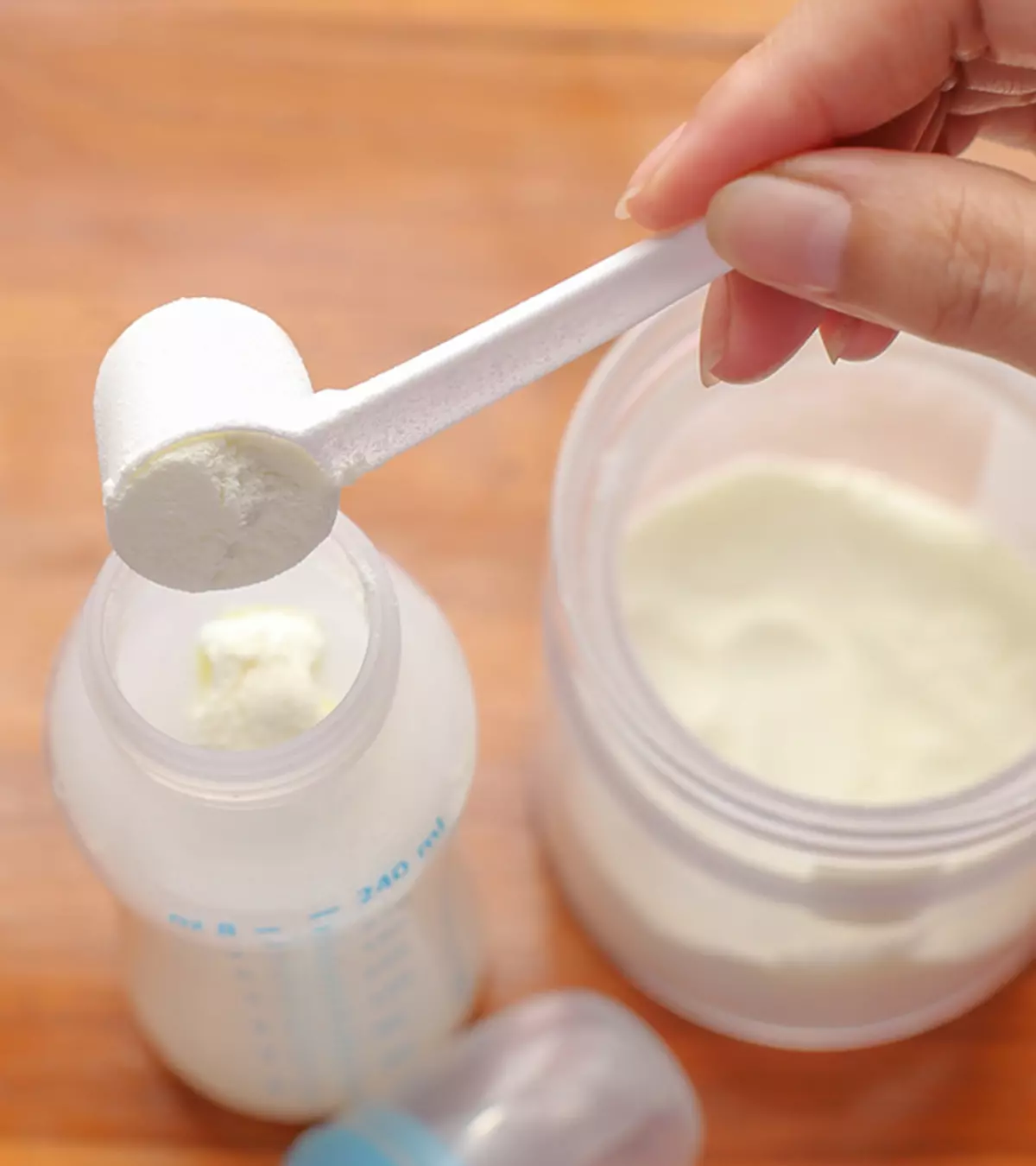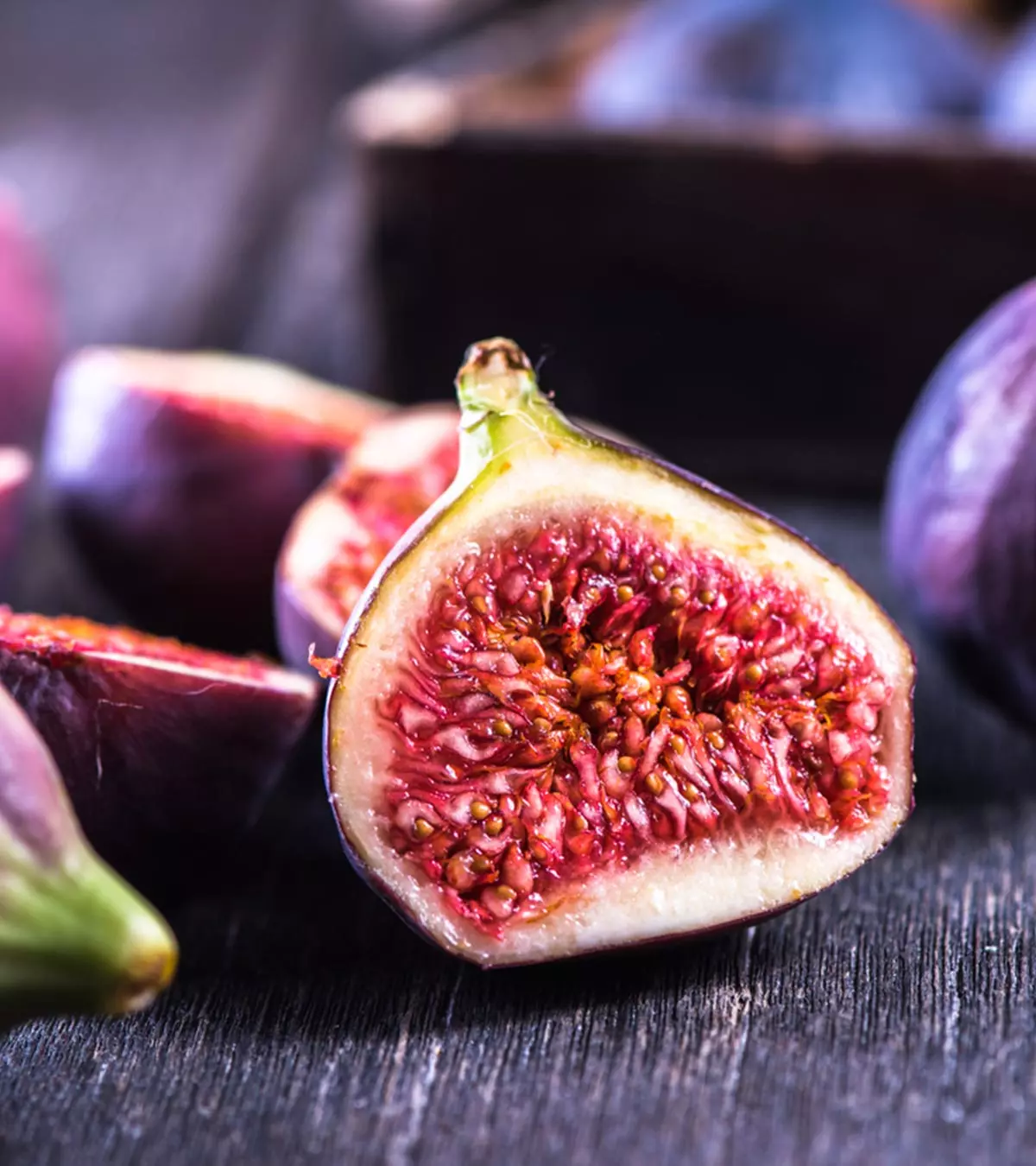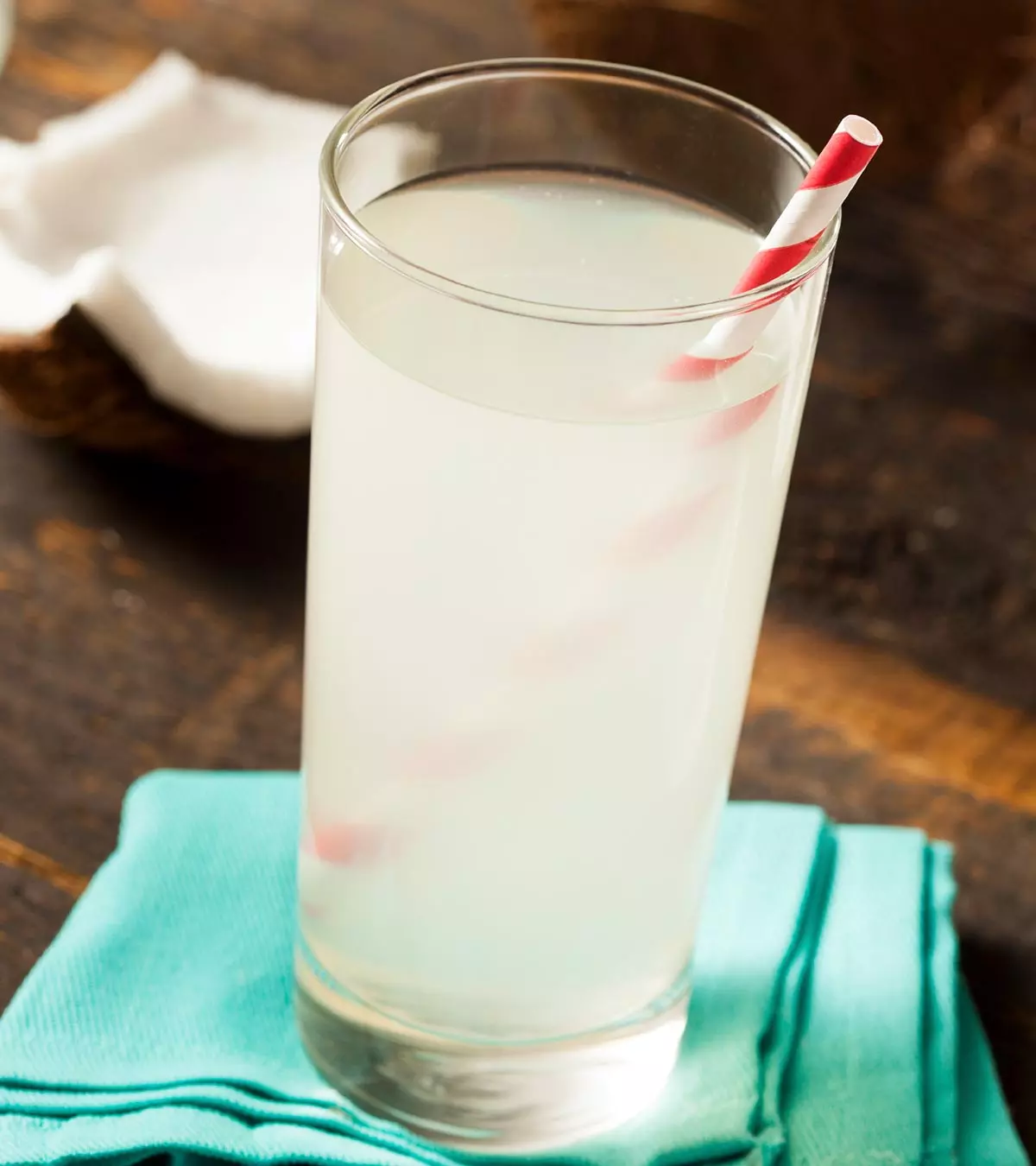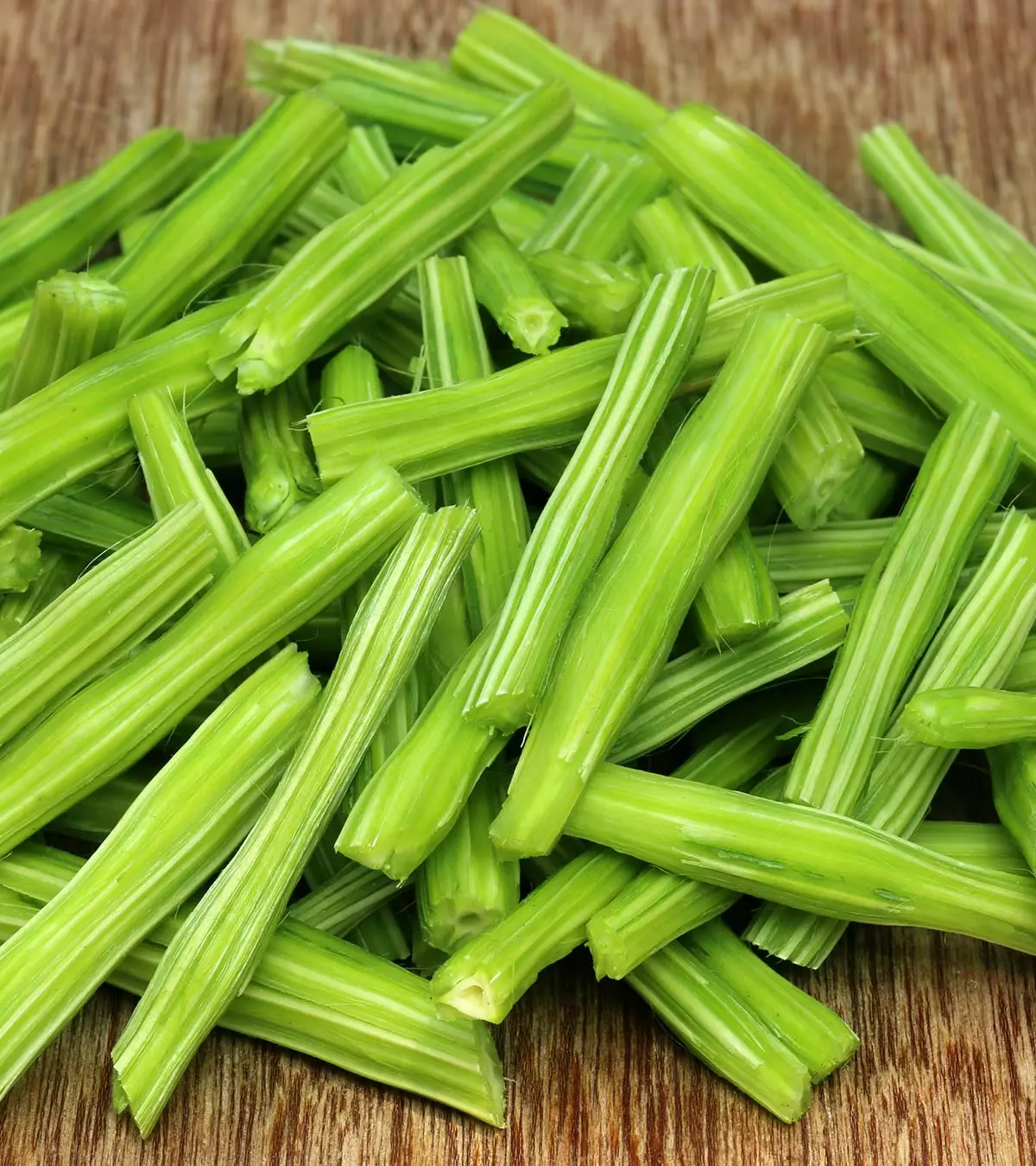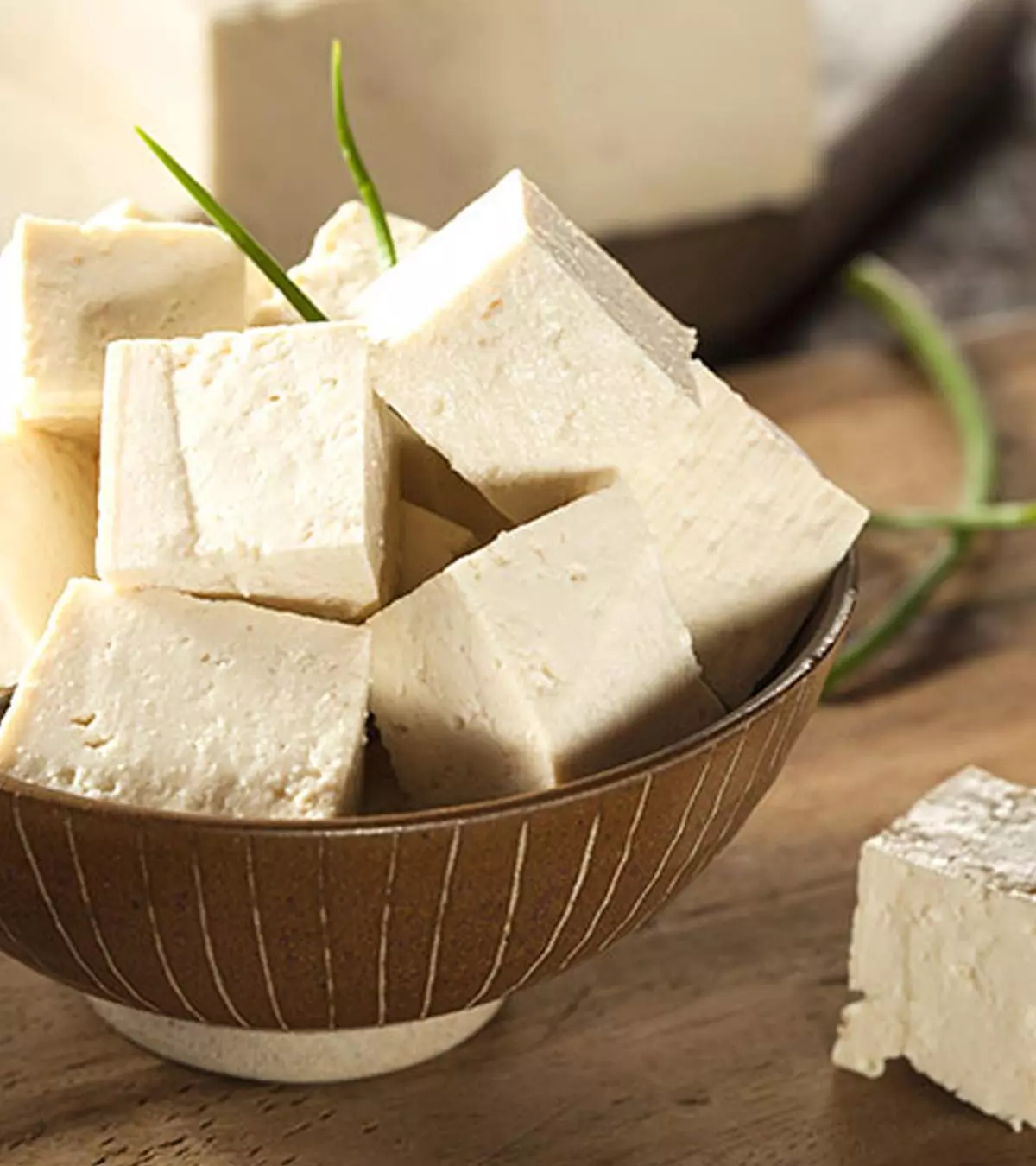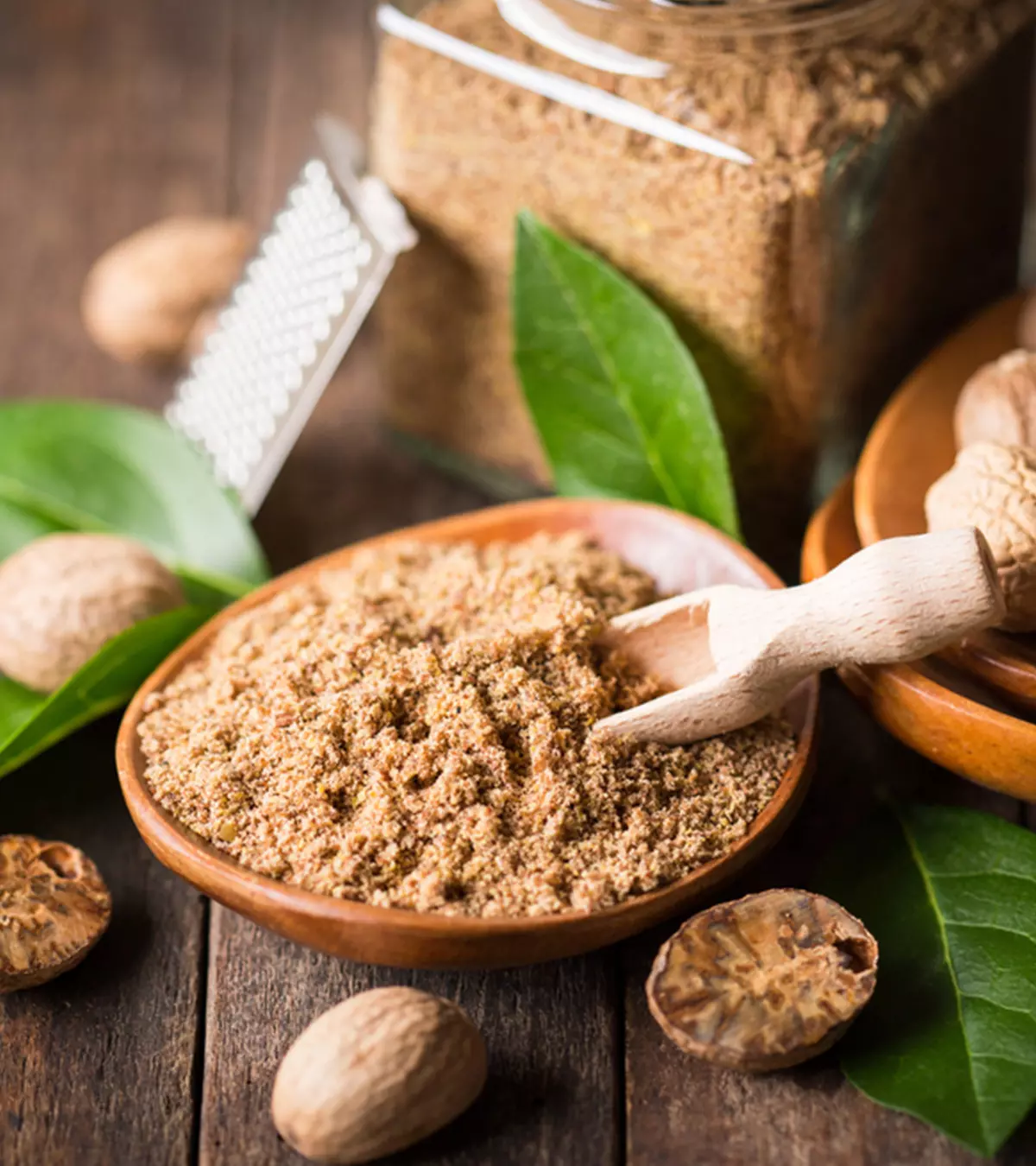
Image: ShutterStock
Once your baby is on a solid diet, you may consider adding several food items to their meals. Nutmeg for babies may be considered to improve the meals’ flavors, but is it safe?
Nutmeg is an aromatic spice obtained by powdering the dried seeds from the fruits of Myristica trees. The spice is known for its sweet taste and rich aroma and has been a part of many cultures for centuries. Additionally, it is considered to have some potential health-promoting properties. However, it’s crucial you understand its safety and appropriate use when considering it for babies.
Read this post to learn about the safety of nutmeg for babies, the right age to include nutmeg in your baby’s diet, its possible uses, and precautions to take while feeding it to babies.
Key Pointers
- Nutmeg is usually considered safe for babies, though the safe quantities are not specified.
- This flavoring agent contains some minerals and vitamins that may provide indigestion relief and improved appetite.
- Add only a pinch or two of nutmeg powder or paste in a portion of baby food and discontinue if the baby shows any sign of discomfort.
Is Nutmeg Safe For Babies?
According to the US Food and Drug Administration (USFDA), nutmeg is generally recognized as safe to use as a food ingredient (1). However, there are no specific recommendations about its safety for infants. Therefore, consult a pediatrician before adding nutmeg to your baby’s diet.
Padmajha PJ, a mother, and blogger, talks about an ancient tradition of feeding babies nutmeg concoction mixed with more herbs and breastmilk to improve appetite, reduce colic, and aid digestion. She says, “Giving nutmeg to infants has been practiced for a very long time. It cannot be given whole or powdered. First, nutmeg has to be processed…I have been giving this to my little angel from day 11 till date.”
She then explains how the nutmeg must be processed by boiling it in milk and then drying it hygienically. Once this is done, the nutmeg must be rubbed on a grinding stone, and a minimal amount must be mixed with the breastmilk to feed the baby (i).
When Can Babies Have Nutmeg?
If your pediatrician gives you a nod, you can feed small amounts of ground nutmeg as a flavoring agent or spice to babies older than six months.
To incorporate nutmeg’s flavor into your cooking, you can prepare nutmeg powder or paste using dried nutmeg seeds.
Purees, stews, cereals, casseroles, drinks, baked items, salad dressings, and soup recipes for babies are some foods where nutmeg can add flavor.
How Much Nutmeg Can Babies Consume?
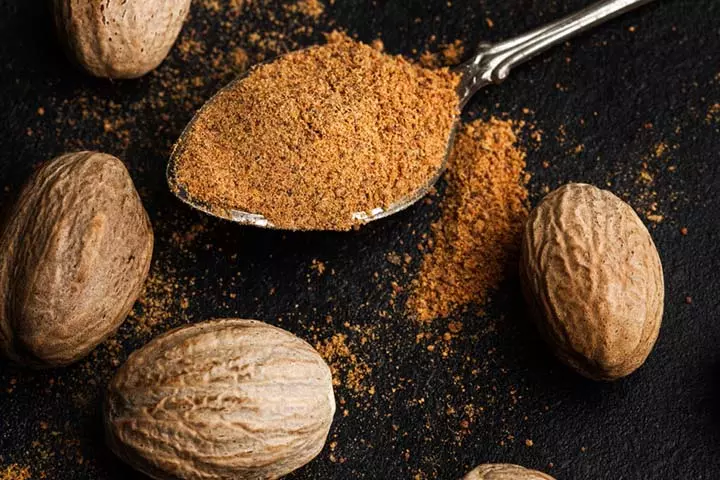
Image: Shutterstock
According to the American Association for Clinical Chemistry (AACC), nutmeg intoxication can occur after ingesting as little as one to four teaspoons (5 to 20g) of ground nutmeg in one serving (2) (3). Therefore, use no more than a pinch or two of nutmeg powder or paste in a single portion of baby food.
Nutritional Value Of Nutmeg
Small amounts of nutrients found in nutmeg powder can improve the overall nutrition of a meal. A teaspoon (2.2g) of nutmeg powder offers 4.69mg of phosphorus, 4mg of calcium, 4.03mg of magnesium, and 7.7mg of potassium. It also provides trace amounts of folate and vitamin A (4).
Possible Benefits Of Nutmeg For Babies
Nutmeg contains several bioactive compounds possessing therapeutic properties. The usage of this remedy is prevalent in folk and alternative medicine for treating illnesses and enhancing overall health through its medicinal benefits (5).
- Relieve indigestion: The use of nutmeg to treat digestive disorders is prevalent in traditional medicine. A freshly prepared decoction of nutmeg with honey is known to relieve gastrointestinal issues, such as indigestion (6). This remedy aids digestion and may be useful for babies older than 12 months who can consume honey (7). It is also believed to be effective in alleviating colic in babies.

Image: Shutterstock
- Improve appetite: Nutmeg has carminative effects, helping relieve flatulence, gas, and bloating (6). These effects may also help promote appetite in babies.
- Support immunity: Nutmeg has several bioactive compounds, such as eugenol, isoeugenol, and methoxyeugenol, with antioxidant properties. Besides, it has anti-inflammatory and immunomodulatory properties that may boost an infant’s immunity in the long run (6) (8).
 Quick fact
Quick fact- Promote oral health: Nutmeg has antimicrobial properties that could promote oral health by fighting off oral problems, such as bad breath, cavities, and bleeding gums. It can also relieve toothache through its pain-relieving properties attributed to eugenol (6) (8) (9).

Image: Shutterstock
- Aid in skincare: Topical application of a paste of nutmeg powder with curd, raw milk, or honey to improve skin texture is an age-old skincare. Its use to treat skin infection is also prevalent in traditional medicine (5) (10).
Most alternative uses of nutmeg are colloquial, and little is known about its safety in babies. Therefore, consult a doctor before using nutmeg as a home remedy in babies.
 Did you know?
Did you know?How To Select And Store Nutmeg?
You can purchase whole or ground nutmeg powder. Consider the following points while purchasing nutmeg for babies.
Tips for selecting and storing whole nutmeg
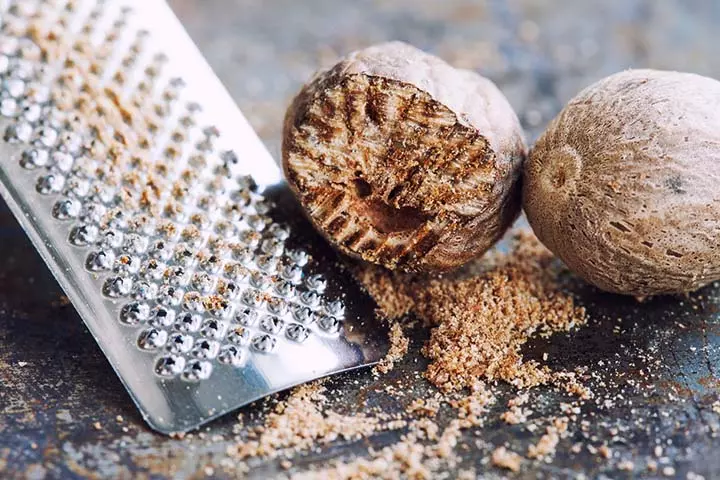
Image: IStock
- Prefer to buy the whole, dried nutmeg seed if you use nutmeg occasionally. It will ensure you always get a freshly grated, flavorful spice for use.
- Buy from a reputable and trusted store to ensure the product’s quality.
- Discard produce that looks discolored, water-logged, or moldy. A nutmeg with tiny holes indicates pest infestation.
- Buy nutmeg that is hard to touch, has a rough surface, and feels heavy for its size. These are the features of a good-quality nutmeg.
- Store nutmeg in an airtight container in a cool, dry place away from direct sunlight, heat, and moisture to keep it effectively useful for years.
Tips for selecting and storing ground nutmeg
- Always buy ground nutmeg in small quantities as the spice in its ground form loses its aroma and flavor quickly.
- Buy ground nutmeg from a trusted manufacturer and store. Powdered nutmeg has higher chances of adulteration or contamination.
- Check for “manufacturing” or “to be used by” date for proper storage.
- Store the powder in an airtight container and keep the container in a cool, dry place away from heat, direct sunlight, and moisture.
- Refrigerate the opened pack or container for longer shelf-life.
Precautions To Take While Feeding Nutmeg To Babies
Below are some precautions to observe while feeding nutmeg to babies and toddlers.
- Before grating the whole nutmeg for use, wash it thoroughly under cold running water to remove dust and dirt that might be present on its surface.
- Grate the whole nutmeg to make its smooth paste, ensure no lumps or chunks are left.
- Every time you use ground nutmeg, rub a small amount of powder between your fingers and smell. If there is a faint aroma or no aroma, it usually signifies that the powder has become stale.
- Mix only a pinch or two of nutmeg paste or powder to a serving of baby food. Feeding nutmeg in excess can increase the risk of nutmeg intoxication (3).

Image: Shutterstock
- Preferably use nutmeg as a seasoning with a compatible recipe your infant is already consuming comfortably. It will help identify intolerance, sensitivity, or allergy towards nutmeg easily.
- If your baby looks uncomfortable after ingesting nutmeg, discontinue feeding and try again later.
- Nutmeg allergy is rare but possible (11). Consult a pediatrician before feeding nutmeg to the baby, especially if they have a family history of food and seed allergies, as it can impact their development.
- Keep the ground nutmeg away from your child’s reach to avoid accidental ingestion.
Frequently Asked Questions
1. Does nutmeg make the baby sleep?
Research indicates that nutmeg powder may improve sleep and help alleviate insomnia (12). However, there is no research on babies, and more targeted research is needed to determine the effectiveness of nutmeg in improving sleep.
2. Can I add nutmeg to milk?
You can add a pinch of nutmeg powder to milk and serve it to babies older than 12 months. Speak to your doctor before feeding nutmeg to your baby this way.
3. Is nutmeg good for breastfeeding?
Nutmeg may have anti-progesterone effects, which may (theoretically) support lactation. However, consuming too much nutmeg during nursing can cause anticholinergic intoxication, which may also reduce breast milk supply by inhibiting growth hormone and oxytocin secretion (13) (14).
4. How can I use nutmeg when my baby has a cold and cough?
Traditional medicine like Ayurveda uses nutmeg as a natural remedy to treat upper respiratory issues (16). You can add a pinch of nutmeg powder or paste to warm baby foods, such as soup or porridge, and feed them. Nutmeg will add flavor to the food and might also help relieve cold and cough in babies.
5. Does nutmeg stop diarrhea?
In folk medicine, nutmeg is used to treat gastrointestinal issues, such as flatulence and diarrhea (15). However, very little clinical evidence exists to support nutmeg’s anti-diarrheal effects.
6. Does nutmeg cause constipation in babies?
Moderate consumption of nutmeg is known to relieve indigestion and flatulence (17). However, it is not known to cause constipation.
7. Is nutmeg poisonous for children?
Dr. Po-Chang Hsu, a doctor of medicine and medical expert from the Greater Boston Area, says, “Nutmeg can be toxic if consumed in large amounts. It contains myristicin, a compound that can cause symptoms such as nausea, dizziness, increased heart rate, and, in high doses, even hallucinations or seizures.”
Nutmeg is a fragrant spice used as a flavoring agent in food. A small quantity of nutmeg paste or powder may be added to baby foods such as purees, soups, stews, porridges, cereals, drinks, and baked items once they are six months old. However, ensure you procure the whole dried nutmeg seed from a trusted source, not the powdered form, to ensure purity. The health benefits of nutmeg for babies include resolving digestive issues and promoting oral health. Nutmeg rarely causes allergies, but you should look out for any signs of discomfort in your baby.
Infographic: Using Nutmeg As A Flavoring Agent For Baby Food
A small quantity of nutmeg can be added to sweet and savory dishes, enhancing their flavor. If your baby likes nutmeg’s taste, add a little of it to their favorite puree or food item. The infographic below lists some baby foods with which the aroma of nutmeg works well. Illustration: Momjunction Design Team
Illustration: Nutmeg For Babies: Safety Right Age And Benefits
_for_babies_safety_right_age_and_benefits_illustration.jpg.webp)
Image: Dall·E/MomJunction Design Team
Unveil the secret to a simple yet effective home remedy for your baby’s cold and cough, utilizing the power of Jaiphal (Nutmeg). Also, gain valuable insights from this video into winter baby food tips to ensure your little one’s health and happiness.
Personal Experience: Source
MomJunction articles include first-hand experiences to provide you with better insights through real-life narratives. Here are the sources of personal accounts referenced in this article.
i. Nutmeg – Grandma’s remedy;https://seduceyourtastebuds.com/2008/07/nutmeg-grandmas-remedy.html
References
1. Nutmeg; Drugs and Lactation Database; NCBI
2. Nutmeg; AACC
3. Jamie E. Ehrenpreis et al.; Nutmeg Poisonings: A Retrospective Review of 10 Years Experience from the Illinois Poison Center, 2001–2011; NCBI
4. Spices, nutmeg, ground, FDC ID: 171326; Fooddata Central; USDA
5. Ehab A. Abourashed and Abir T. El-Alfy; Chemical diversity and pharmacological significance of the secondary metabolites of nutmeg (MyristicafragransHoutt.); NCBI
6. NamraNaeem et al.; Nutmeg: A review on uses and biological properties; Researchgate
7. Botulism Prevention; CDC
8. FelitaDhaslin et al.;Dhaslin, YF et al.; Antioxidant, antimicrobial, and health benefits of nutmeg; United States Environmental Protection Agency
9. KritikaJangid et al.; Achievable therapeutic effects of myristicafragrans (NUTMEG) on periodontitis a short review; Researchgate
10. V.P. Samaranayake et al.; Efficacy of Nutmeg as a Face Cream an Mukhsdushika; Researchgate
11. Nutmeg; Anaphylaxis Campaign
12. Prathibha C K et al.; Managing Insomnia With Jathiphala (Myristica Fragrans) Powder – A Pilot Study; NCBI
13. Nutmeg; NCBI
14. Cyclopentolate; NCBI
15. Ehab A. Abourashed and Abir T. El-Alfy; Chemical diversity and pharmacological significance of the secondary metabolites of nutmeg (Myristica fragrans Houtt.); NCBI
16. The use of nutmeg as a psychotropic agent; UNODC
17. Five things everyone should know about nutmeg; College of Agriculture and Life Sciences
Community Experiences
Join the conversation and become a part of our nurturing community! Share your stories, experiences, and insights to connect with fellow parents.
Read full bio of Jennifer Swallow

Dr. Po-Chang Hsu is a medical doctor and medical content expert. He received his medical degree from Tufts University School of Medicine in Boston in 2016. Previously, he did a master’s degree at Harvard University and wrote a thesis on neuroimaging in schizophrenia patients at Brigham and Women’s Hospital. He currently works at Alpas Wellness.
Dr. Po-Chang Hsu is a medical doctor and medical content expert. He received his medical degree from Tufts University School of Medicine in Boston in 2016. Previously, he did a master’s degree at Harvard University and wrote a thesis on neuroimaging in schizophrenia patients at Brigham and Women’s Hospital. He currently works at Alpas Wellness.
Read full bio of Swati Patwal
Read full bio of Rohit Garoo
Read full bio of Ghazia Shah












